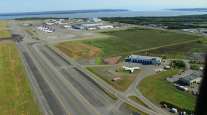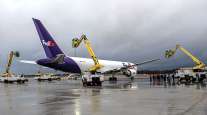Senior Reporter
Atlanta Joins Top Tier of Global Supply Chain Powers

[Stay on top of transportation news: Get TTNews in your inbox.]
Already the world’s busiest passenger airport, Atlanta’s Hartsfield-Jackson International Airport plans a nearly $500 million expansion of its air cargo facilities to accommodate steady economic growth in the Southeast U.S.
Even with the ongoing freight recession, trucking, rail, ports and airlines are planning for more growth to handle the expected surge in freight in the second half of this decade and into the 2030s.
Airport officials told Transport Topics that $368 million in upgrades for the modernized air cargo facility would come from the private sector, and the remaining money would come from airport funds.
“As a result of the pandemic, our biggest cargo year was 2021,” said Rebecca Francosky, the airport’s director of air service development. “A lot of that had to do with the [personal protective equipment] and all of the things that were flying through and all of the people who were buying online and not shopping in stores, and all of the things that were happening with the Port of Savannah caused us to have a freight fantastic year, more than we ever thought was possible.”

Francosky
Francosky said Hartsfield-Jackson plans to double its existing air cargo facilities on the south side of the airport by the end of the decade. This can be done on its existing 4,700 acres of land, and the airport has been in contact with Amazon.com Inc., which debuted this year at No. 1 on the Transport Topics Top 50 list of the largest global freight companies.
Also under evaluation was a possible sixth runway at Hartsfield-Jackson, but that proposal appears to be on hold. The airport, however, is moving forward with a $10.8 billion passenger terminal expansion and renovation, now underway and scheduled to be completed by 2042.
Flying into Hartsfield-Jackson from any direction, one can see hundreds of Class 8 trucks on the often crowded, 64-mile Atlanta Interstate 285 perimeter, connecting I-85, I-75 and I-20 — all major routes.

Baer
“Atlanta has some advantages when it comes to freight; it is less congested than some of the other international airports,” said Jennifer Baer, vice president of custom brokerage at DHL Freight Forwarding. “It is an easier location to get cargo in and out of, from a turnaround time, compared to O’Hare in Chicago or JFK in New York. It is is a growing region of the country.”
The Atlanta area is now one of the most important commercial, financial and transportation centers of the southeast United States. More than 75% of Fortune 1000 companies have a presence in the region, which hosts the offices of about 1,250 multinational corporations. UPS Inc. has its international headquarters in Atlanta, and in October 2018 the company opened a 1.2 million-square-foot distribution center capable of processing more than 100,000 parcels per hour.
UPS ranks No. 1 on the Transport Topics Top 100 list of the largest for-hire carriers in North America and No. 2 on the global freight companies TT50.
Rishi Mehra of Trimble sheds light on the immense support that transportation technology can provide to enhance the efficiency of the physical supply chain. Tune in above or by going to RoadSigns.ttnews.com.
The expansion at Hartsfield-Jackson comes after A.P. Moller-Maersk and DHL expanded their operations in the Atlanta area this past summer. Maersk added a nearly 125-square-foot gateway at the airport that offers direct plane side recovery with an immediate unit load device transfer portal to the new facility.
And on July 6, DHL Express opened an $84.5 million, 100,000-square-foot hub there, which the company says establishes direct connections between Atlanta and 19 cities in the Southeast and key global markets, including Europe. Eventually, the facility will operate flights to Hong Kong, Mexico, the United Kingdom and Puerto Rico. The fully automated facility is equipped with technology capable of sorting up to 20,000 pieces per hour.

Cassidy
Chris Cassidy, CEO of supply chain management company Mojix, said the region’s growth is much larger than just the 13 counties that make up the metropolitan area. He noted the transportation industry expansion is taking place in parts of Alabama, Tennessee, North Carolina, South Carolina and Georgia. Much of it is being driven by the friendly business climate and the decisions by government and policymakers to expand infrastructure projects, including highways, roads, bridge, airports, and inland and water-facing ports.
The expanding Port of Savannah is 3½ hours away by truck along once-seldom-used I-16, which is fast becoming one of the more important interstates in the nation, especially in terms of truck traffic from Savannah to other parts of the Southeast.
“One hundred fifty years ago, Atlanta was the unique, prime location for the railroads, and more than 80 years ago, Delta moved its headquarters here, and Hartsfield-Jackson has expanded right alongside it,” Cassidy said. “Atlanta is uniquely positioned with its transportation lanes, the highways, the ports and the airport. It’s now one of the most important supply chain and logistics hubs in the world.”
Want more news? Listen to today's daily briefing below or go here for more info:





